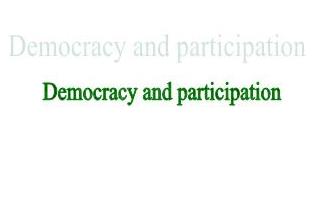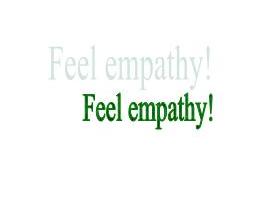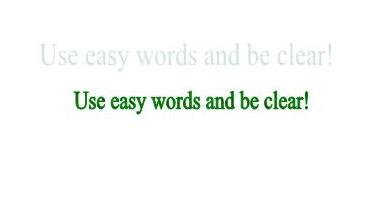How to maintain good communication as a person in authority, or how to communicate in every day life!
Human communication is the key to understanding, development, friendship and relationship, cultures and societies. The ability to communicate is a vital social skill and the importance of good communication grows as we become more and more interdependent of each other. Even if you don’t work as a person in authority, maybe you as a citizen have met, or will meet, a representative from an Authority. And if not, you still have to communicate with people around you, at work, at home or with friends. This article can give information to all who in some way communicate with others, and also information on how to induce someone to do something they don’t want to do!

I work as an environmental and health inspector and I have the privilege to meet all kind of people in my work. It is part of the fun with this work; no meetings with people can ever become predictable. You never know how a forthcoming meeting with a citizen will develop or is ended. Sometimes when I think that a meeting will be very difficult, everything works smoothly, and sometimes when I’m not prepared for major issues the meeting can be difficult and strained.
But in every meeting with citizens and entrepreneurs I have one goal; to maintain communication! That is one of the most important and also the most difficult part in this work. Anyone who works as a person in authority is also responsible for the communication - we have to take responsibility for all parties concerned! When communication is lost, we have failed.
In my work I do field surveys, I visit industrial settings of all kind, waste facilities, property owners and so on, and I encounter all kinds of people, from CEOs of major companies to owners of sole proprietorships. Besides business people, I also have supervision of individual citizens. But really there is no difference at all; no matter what title a person has, the important thing is that they are all human beings. Possibly, I tend to have slightly higher demands on law knowledge from a business, but unfortunately this is not something you can count on either! The purpose of the work is to ensure conformance with federal, state, and local regulations and ordinances.
The people I meet come from different cultures, have different political thoughts, and they also have different abilities. Some of them can even have mental illness. Much of the work consists of conversation and communication; conversations with citizens, neighbours to business, businesses, politicians and colleagues. With experience I have learned some ways to maintain good communication also in difficult situations. Some of it have I brought with me from my former profession as a nurse at an emergency department and in cancer care and some is experience from my current job.
So, what are the problems I may face in my work? I will give you some examples and some of them are the same problems you can face in normal life too, even if you do not meet this specific type of people!
How do you respond to entrepreneurs or citizens who will not listen, who have prejudices against the authorities and are confident that I have made it all up myself because I have an evil personality? They can be cynical, provocative, manipulative or aggressive. Or the opposite, they may also perceive themselves as victims of government power abuse and burst into tears during the inspection time. Another category are those who says yes and agrees to anything you say, smile and are very charming, but then don’t even try to make the necessary steps that we agreed on. Then there are those that are impossible to meet, that does not answer the phone, refuses to open the door or are not in place despite the scheduled visit. Last but not least is the category that will do anything to try to make a fool out of the inspector by pointing to the inspector’s lack of knowledge of their activities. And I must also add those who believe that their personal finance situation should cause that the law does not apply to them! But in general most people are reasonable and behave ever so polite and correctly and with them, communication isn’t a problem.
But what about the others that I mentioned above and what is it that I do that can cause all these reactions? I will tell you; I infringe on their territory, and moreover I say that they are doing something wrong, and I require that they must take actions they sometimes consider to be completely unnecessary and can be expensive for them! For example, imagine a property owner who has a substandard sewage system and who have to invest in a new, a property owner of an apartment block which has to invest in a new ventilation system so the tenants should have a decent living environment, a car painter who need to improve the management of chemicals, a plastic factory that will have to invest in a new treatment plant for the outgoing air, a service station who must fill in checklists to show that they have done necessary controls to reduce risks of fire/accident and so on. The visits may mean that I issue warning and citation to lawbreakers. In all this visits I infringe on their territory, and to such intrusions, we react different. If they don’t understand why they are not likely to do it voluntarily.
Then, now when we all know the background, how do you maintain good communication?

Democracy and Participation
I want to start with the fundamental basics; Democracy and Participation.
The right to participate is part of citizenship and participation is a prerequisite for democracy. The degree of participation may vary but to invite to a dialogue is a first step towards participation. Everyone is entitled to an opinion and we don’t need to have the same opinion. But we must be able to talk about it. You might think that there isn’t any democracy in getting a visit from the authority, but I think there is. You might not like what the inspector say, or you might even consider the law to be wrong. And that is part of a democracy; you are entitled to those opinions, but remember that the laws are decided in a democracy! And if you don’t understand the law, use the inspector for an explanation! And as an inspector, use the meeting to learn something new! There is a value to utilize the different skills and experiences that citizens have. We can always learn something new from a dialog with others and it would be a shame to miss that opportunity.
The next things listed here do not come in any particular order, they are all very important for communication.

See the person in front of you!
View and confirm the man in front of you.
Every human wants to be taken seriously and treated with respect. Make sure that you don’t miss the first crucial moments. Look the person in the eye and greet him/her in a polite way. Be aware that you come as a government official and try to get a first impression of the man in front of you. You must, within a few seconds, determine how to approach the person and communicate at the right level. Since you both are humans, start with something casual, like small talk about the weather or something suitable. The purpose is to create an initial dialog and that is easier to do about everyday things that are not sensitive. By treating the person like this you show that you both are humans!

Feel empathy!
You must be able to feel empathy!
To empathize is to understand how another person experiences a particular situation and also to express yourself so that the other person understands that you have understood. Empathy is one of the basics in a good dialogue. But you should not feel sympathy, you are not supposed to share the other’s emotions and share feelings of anger or despair. That can have the opposite effect on a dialogue.


Listen!
Make sure that you really listen! Sometimes we are so busy with figure out our next sentence that we miss what the other person says. Don’t do that mistake! That can really offend people and be the sparkle you don’t want. Really stop and listen to what the other has to say, and most importantly, confirm that you understand. You don’t need to agree but it is important that you understand. The best way to tell somebody you have understood is to say; Did I understand you correct now, you mean that……. This is a great way to confirm that you have listened and to prevent future misunderstandings.
Use easy words and give clear messages!
Talk so they understand what you say and avoid using technical expressions. Make sure that they understand what you say, and the most important, make sure they know what is required of them. If needed, be firm and specific about what you want! I always repeat in the end what we have agreed on, or what they need to do even if we disagree.

Ask questions
To ask questions can give the conversation so much value! The things you see can get a better content if the owner explains how and why. You can start with questions that stimulate the other to tell, for example; how did you do this, and how were you thinking when you designed this? If you do not understand, ask again, it is the one who manage the business/company that has the best knowledge about their particular business. Do not pretend that you understand if you don’t.
If you need to, ask challenging questions, but be careful. Challenging questions can be perceived as if you claim that the person in front of you is lying. That will not take the communication towards mutual understanding.

Switch between distance and proximity
To switch between distance and proximity is a basic ingredient if a conversation is supposed to lead to common understanding. You have to switch between distance and proximity to both your self and the person in front of you. When you have distance to your self you can relate to the other persons perspective, and can also critically examine yourself. When you have proximity to your self and distance to the other person the difference between your views becomes obvious which is an important step to understanding.

Be a man and allow yourself to have emotions!
Even an environmental and health inspector is a human being! (Surprise!) And like most humans we don’t like to upset people or make their life miserable, we don’t like when someone ridicules us, behave aggressively against us, or try to manipulate us. We react like anybody else in that situation, we feel compassion, aggression, and all human defence mechanism is triggered if we are attacked. But as the representative for the government you can’t allow yourself to act those emotions out free, even if you get as mad as ever. You have a purpose with your visit or inspection, and that isn’t to make enemies. Don’t allow yourself to be provoked or be diverted from your task. But you must allow yourself to have all these feelings! Acknowledge the feelings you have, no matter what they are, and let the feelings be there. By allowing ourselves to feel emotion, we still have contact with the man within us. There is nothing worse than an inspector who is not a human being. But make sure that the good communication continues and do not let it degenerate into a heated debate.

Don’t take it personal!
Often, I find that the business/citizen perceive and treat me as if I am the law, or as if I have come up with these things myself when sitting in my office. And some seems to believe that if they only get rid of the inspector their problems are solved. In those cases you can run into personal attacks, and it is never permissible. Do not allow that to happen! Then you have to clearly show that there goes definitely the limit for you. Look at yourself as a messenger for the law, but you are not the law, and this must be totally clear to the other person. You don’t shoot the messenger!
If it still goes wrong!
If a dispute is escalating, end the visit by saying; “I see that you are very upset now, and we will probably not reach any agreement today. I propose that we meet again in a week”.
Often it goes better the next time, when both have had time to think it through.
If it doesn’t, there is nothing else to do than to take imperative measures, issue warnings and write an injunction even if they do not understand why! With some people that is the only way. You can’t win them all, but you have to try!








